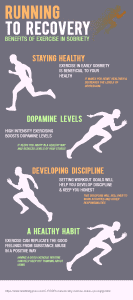Coping with the sense of loss many people experience after getting sober can be difficult. They may feel like nothing they do will make them as happy as using drugs or alcohol did. However, one of the most effective coping mechanisms for this sense of loss is to get regular exercise. Exercise is beneficial for people in sobriety in several ways. One of the most important benefits comes from the clarity and structure that regular exercise can provide a person in recovery.
Staying on the road to recovery can be tough. It’s a lifelong commitment that requires constant progress, like a marathon. At Northpoint Seattle, we know how important it is to learn the skills for a lifetime of sobriety. Our alumni program provides compassionate support after addiction treatment so that you can build upon the foundation for a healthy future. Call 888.483.6031 to get started today.
Benefits of Exercise in Sobriety
Exercise helps provide holistic therapy, helping to heal the mind, body, and soul. Some of the specific benefits include:
Physical Health Benefits
From muscle to heart health, there are many physical benefits of exercise. Through exercises like running, weightlifting, or yoga, people in sobriety can improve their cardiovascular health, increase their endurance, and build muscle strength.
Exercise also helps reduce inflammation throughout the body and can even help improve brain function. As a result, many people in sobriety find that regular exercise helps them think more clearly and makes it easier to focus on their goals.
Mental Health Booster
In addition to the physical benefits, exercise is also a powerful mood-booster. Research shows that regular exercise can help reduce symptoms of anxiety and depression. For people in sobriety, this can be especially helpful in managing triggers and coping with stress.
Other mental health benefits of exercise include improved sleep, increased energy levels, and enhanced self-esteem.
Helps Develop Discipline
One of the most important benefits of exercise for people in sobriety is that it helps develop discipline. Sticking to a regular exercise routine requires setting goals, planning, and being accountable for actions.
These are all essential skills for maintaining sobriety. By developing these skills through exercise, people in recovery can transfer them to other areas of their life, such as their recovery goals.
Reinforces Routines
Another way exercise helps people in sobriety is by reinforcing positive routines. Just as regular exercise requires sticking to a set schedule, so does recovery.
People in sobriety often find that having a set routine helps them stay on track. Exercise can help reinforce this routine by adding another healthy activity to the daily schedule.
Finding an Alumni Program after Addiction Treatment
The benefits of exercise in sobriety can help you stay on track to a healthy, happy future. An alumni program can be an excellent place to share your progress and check in with those you connected with during treatment. Other benefits of an alumni program include:
- Access to a safe place to share your story and get support from people who understand what you’re going through
- Connection to a community of people committed to sobriety
- Accountability partners to help you stay on track with your goals
- Access to resources for maintaining sobriety
Run Toward Recovery with Northpoint Seattle
If you’re ready to start your journey to recovery, Northpoint Seattle is here to help. We offer a variety of addiction treatment programs that work to meet your unique needs. We also have an alumni program that provides supportive services after treatment.
Your success in sobriety is our priority. Don’t put off your pursuit of a healthier future. Call 888.483.6031 today to get started with a recovery specialist.






